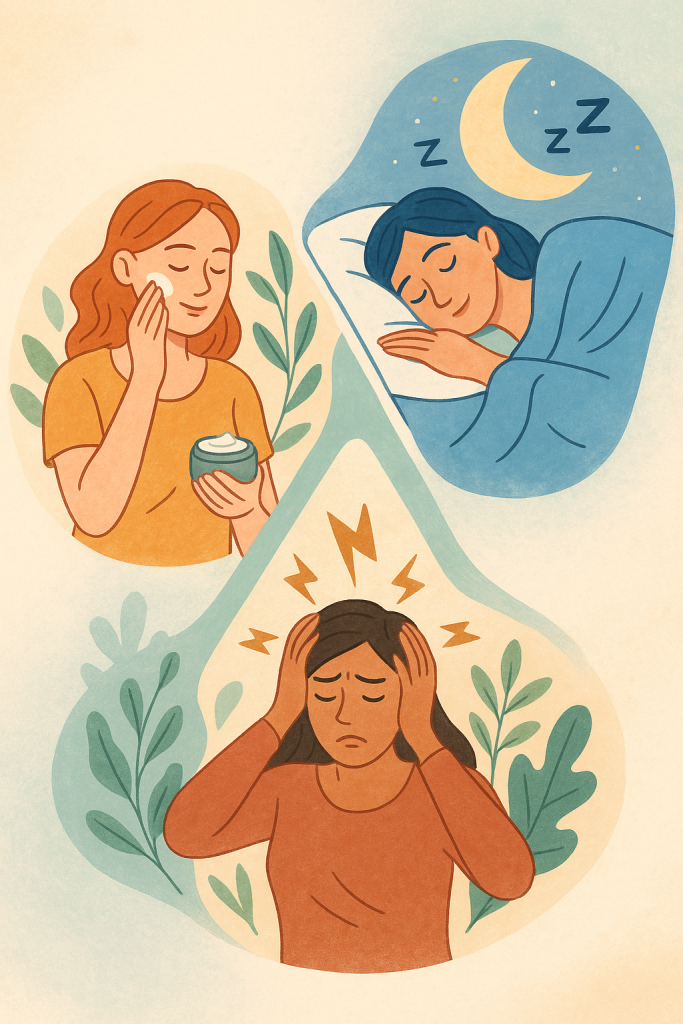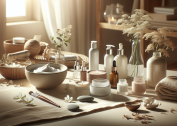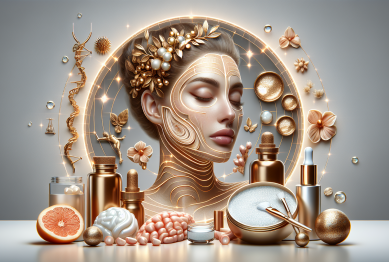Skincare, sleep, and stress are not just buzzwords—they are the three pillars shaping how we look, feel, and function every single day. From dark circles and breakouts to burnout and insomnia, the connection between these three components is stronger than most people realize. In this article, we unpack the latest science and trends surrounding this crucial health triangle and offer practical solutions for mastering it.

What is the Skincare, Sleep, and Stress Triangle?
When we talk about skincare, sleep, and stress, we’re really talking about a three-way relationship that has powerful effects on your health, aging process, and emotional wellbeing.
Each element feeds into the next:
- Poor sleep increases stress hormones and damages skin.
- High stress disrupts sleep and causes inflammation in the skin.
- Damaged skin can lower self-esteem, increasing stress and harming sleep further.
This cycle creates what dermatologists and psychologists alike are now calling the “wellness triangle”—a model for understanding how these three essential aspects of daily life are inseparably linked (Chrousos 2009).
Sleep: The Night Shift Worker for Your Skin
Sleep is often dubbed “nature’s moisturizer”—and for good reason. While you sleep, your body repairs itself. This is when collagen production increases, skin cell turnover accelerates, and hydration levels rise.
A consistent lack of sleep does more than just make you groggy—it wreaks havoc on your appearance:
- Increased cortisol levels lead to collagen breakdown and more wrinkles.
- Blood flow to the skin is reduced, resulting in a dull complexion.
- Inflammatory skin conditions such as acne and eczema worsen (Gupta et al. 2020).
A landmark study published in Clinical and Experimental Dermatology found that poor sleepers had increased signs of intrinsic aging, including fine lines, uneven pigmentation, and reduced elasticity, compared to good sleepers (Oyetakin-White et al. 2015).
Stress: The Skin’s Silent Agitator
Stress may be mental, but its effects on the skin are vividly physical. High levels of stress hormones—primarily cortisol—disrupt the skin barrier, leading to:
- Increased sebum production and acne breakouts
- Slower wound healing
- Heightened sensitivity and redness
Even more alarming, chronic stress can also impair the immune response of the skin, making it more susceptible to infections and flare-ups of existing conditions like psoriasis or rosacea (Peters et al. 2021).
Emerging research from the American Academy of Dermatology shows that mindfulness and relaxation therapy are increasingly being integrated into dermatology treatment plans, particularly for patients dealing with chronic stress-related skin conditions (AAD 2023).
Skincare: Not Just Topical—It’s a Full-Body Experience
The latest wave of skincare isn’t just about applying creams—it’s about full-body wellness. Brands are now infusing products with ingredients that help calm the mind, reduce stress, and improve sleep.
Here are current trends reshaping the skincare industry:
- Adaptogens like ashwagandha and reishi are being used in both topical and ingestible products to combat stress.
- Sleep-inducing actives such as melatonin, magnesium, and peptides are being added to night creams to promote restful sleep and skin regeneration.
- Aromatherapy-infused products, especially with lavender and chamomile, are seeing high demand due to their calming effects.
These innovations aim to address all three elements of skincare, sleep, and stress—not in isolation but together, as an ecosystem.
The Vicious Cycle: How Skincare, Sleep, and Stress Interact
It’s not enough to treat one element of the triangle without acknowledging the others. Here’s what the loop typically looks like:
- You sleep poorly → Skin doesn’t repair properly → You wake up with breakouts or dull skin
- You feel stressed about your appearance → This increases cortisol
- More cortisol = less sleep and worse skin → The cycle repeats
Breaking this cycle requires coordinated action across all three points of the triangle.
How to Balance Skincare, Sleep, and Stress: A Practical Guide
Here’s a step-by-step action plan to reset your skincare, sleep, and stress habits starting tonight:
1. Build a Nighttime Wind-Down Routine
- Power down screens at least 30 minutes before bed.
- Include a calming skincare ritual—cleansing, moisturizing, and massaging your face can trigger parasympathetic nervous system activity.
- Use sleep-supportive ingredients like magnesium, peptides, or melatonin-infused serums.
2. Integrate Stress-Reduction Tactics
- Practice deep-breathing exercises or mindfulness meditation each morning.
- Add adaptogen supplements like ashwagandha to your diet (after consulting your doctor).
- Schedule daily “unplugged” time—even 15 minutes helps.
3. Prioritize Sleep Hygiene
- Keep a consistent sleep schedule—even on weekends.
- Keep your bedroom dark, cool, and quiet.
- Avoid caffeine and alcohol at least 6 hours before bedtime.
4. Upgrade Your Skincare Products
Look for formulations labeled:
- “Sleep support” or “overnight repair”
- Containing niacinamide (for inflammation), hyaluronic acid (for hydration), and chamomile (for soothing)
- Fragrance-free, especially if you have sensitive or stressed-out skin
Why Skincare, Sleep, and Stress Will Dominate the Wellness Industry in 2025
Experts believe that skincare, sleep, and stress will be the top-tier health concerns for younger generations. According to a 2023 trend report by Future of Wellness, 70% of Gen Z and Millennials now see skincare as part of their mental health and sleep routine—not just about aesthetics.
In response, major wellness brands like Goop, Biossance, and Moon Juice are launching multi-functional products that tackle skin health, anxiety, and insomnia all in one.
Conclusion: Make the Triangle Work for You
Your skin doesn’t operate in a vacuum—it’s a reflection of what’s happening inside your body. By tackling skincare, sleep, and stress together rather than separately, you’re addressing the root causes instead of just symptoms.
This is more than just a wellness trend. It’s a sustainable lifestyle shift.
So tonight, before you reach for your usual skincare cream, ask yourself:
- Did I sleep enough?
- Am I feeling overwhelmed?
- How can I support my whole body—not just my skin?
Because skincare, sleep, and stress aren’t just connected—they are inseparable.
References
- Gupta, M. A., Gupta, A. K. (2020). ‘Sleep and dermatologic disorders: An update’. Clinics in Dermatology, 38(3), pp. 299-304.
- Oyetakin-White, P. et al. (2015). ‘Does poor sleep quality affect skin aging?’. Clinical and Experimental Dermatology, 40(1), pp. 17-22.
- Peters, E. M. J., et al. (2021). ‘Understanding the skin–brain axis and the role of stress in dermatological diseases’. Journal of the European Academy of Dermatology and Venereology, 35(8), pp. 1627–1639.
- Chrousos, G. P. (2009). ‘Stress and disorders of the stress system’. Nature Reviews Endocrinology, 5(7), pp. 374–381.
- American Academy of Dermatology (2023). Integrative therapies for skin disorders. Available at: https://www.aad.org/public/diseases/a-z/integrative-therapies (Accessed: 5 May 2025).









